





Kanarie is a life-changing film and alters jaded perceptions, a heartbreaking journey into the life of a conscripted soldier in South Africa in the ‘80s, who finds self-love and affirmation of his true identity through the love of another young man.
Kanarie is one of those rare films you cannot resist falling head-over-heels in love with.
This is the second collaboration on film between Lingenfelder and Olwagen, they won a Silwerskermfees award for the soundtrack of Johnny Is Nie Dood Nie.
Christiaan and I were driving to the KKNK in Oudtshoorn and I just started telling him about my military training. He had no idea that I’d been in the army and was very surprised when I told him about the Kanaries. He’d never heard of them either and as we drove, he kept asking me questions and that led to this idea of a film about this very strange set up in the apartheid military. He also immediately saw all the symbolism with regards to the idea of a bird in a cage and the canary in the coal mine. He read so much more into the story than I ever imagined – and that was the beginning of it all.
Kanarie was made in a shockingly short amount of time. Christian pitched the idea to kykNET without me knowing about it and he phoned me from the car afterwards to tell me that he had just pitched my story and they wanted a screenplay. So we started writing the screenplay in August 2016 and by November of that same year, we were shooting. Digging up all this history was extremely difficult, but necessary. We wrote the first draft in about three weeks. We started shooting on draft four of the screenplay. A few things changed during the shoot but that was mainly because of limitations of our locations.
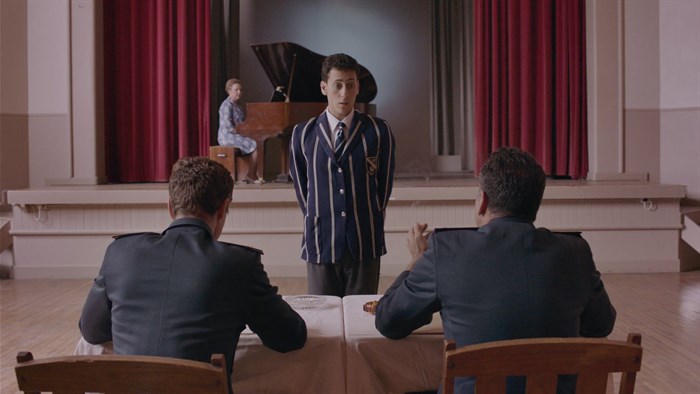
I believe one of the strengths of the film is the fact that it is a very personal story and that it is true. People are very surprised when they find out that approximately 95% of it is factual. It’s not often you get to watch a film of this nature where the narrative is so close to what really happened. We didn’t have to invent a whole lot – it was all just ready to be told.
Christiaan always knew that he wanted to start the film with a sequence that would show our protagonist back in his home environment and what had led to him becoming who he was, by the time the audience meet him.
I had told him about the incident with the wedding dress and he immediately thought this would be a perfect opener to the film. I’d also played him an incredible amount of ‘80s music and the first time he heard Smalltown Boy by Bronski Beat, he fell in love with it. Something about the lyrics, the tone of it – it is very melancholic and he thought it would be perfect for the opening sequence.
We approached choreographer Louisa Talbot, who choreographed all the dance sequences in the film, and she put together a group of dancers who did the opening sequence.
In the sequence, the character’s entire life is being depicted – from his childhood as a four-year-old boy to slightly older as a ballet dancer, and a pianist and doing floral arrangements and fighting over a Barbie doll. We shot the sequence on the second day and luckily everybody was still very fresh because it was a very difficult shoot. There were so many elements involved – traffic, weather, etc. But we finally managed to get the perfect take, just as the municipality was reopening the main road to traffic.
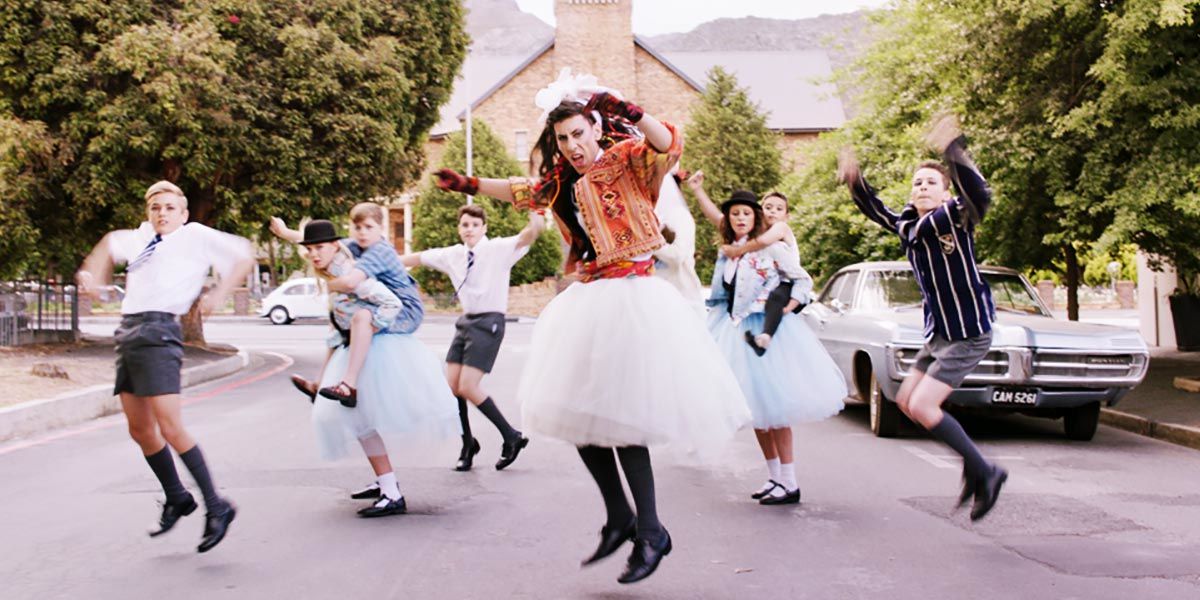
The first thing Christiaan and I did was sit and collect all the stories from my military training. We sat with all these ideas on cards and started moving them around and tried to get a narrative that was coherent. But there was already something about the story that very easily fit into the constraints of a movie narrative structure. The way that the military structure functioned and with our basic training being the beginning of the film, the tour being the second section, and then Johan’s big crisis being the section leading towards the end – it all just made sense in terms of film writing. So that is how we got our structure, and once we decided on it, we didn’t have to make that many changes.
Once again it is true, life being stranger than fiction, sometimes. Even though I exaggerated the characters for the sake of dealing with opposites, they pretty much did fall into those categories.
At every screening that I have attended thus far, people always laugh when the protagonist talks about his passion for his church and for his country.
The script at that point is literally just taken from what I know I would’ve said back in ‘84.
In those days, we simply did not question everything the way we do today. We didn’t know we had the right to question anything. We grew up in a patriarchal society that dictated what we thought and what we did. Johan’s response smacks of naivety and he has no idea how prophetic those words would end up being. All he is trying to do is be a good citizen and a good Christian at that stage, unaware of the journey he is about to embark on.
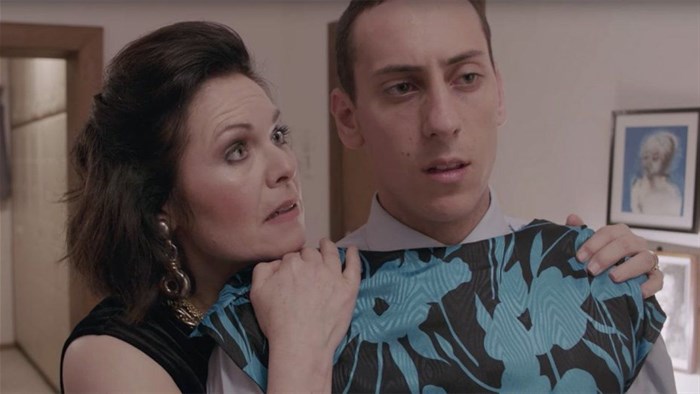
Christiaan has always had a thing for using the film camera the same way you would use stills camera. Having actors stare at the camera as if you are about to take a photo, but just letting it roll. Something happens in those moments. Initially, there is an awkwardness and a shyness, but, eventually that drops away and you get to stare into the soul of this person in front of you. We wanted to see these people for who they were at that age. And, of course, there’s the military machine of receiving your uniform, having your hair cut, going through your medical examination, it is one aspect of military training that everyone, who has been through it, will always remember.
It was a very difficult scene to film because the guys had to perform the physical exercises and it was really exhausting. But ultimately we were happy with the way that the scene came across. We couldn’t spend a lot of time on showing the audience the training that the Kanaries had to go through, so we had to try and condense it all into one or two scenes which would encapsulate the hardship of military training. The corporal’s language is quite extreme, but it is very true to what was being spoken in the army.
We did a lot of research and found almost all of the quotes somewhere online or we were told by people who had encountered that in the army. So once again we didn’t have to exaggerate at all – it was all there all along.
What I love most about the casting of Hannes and Schalk is the fact that they are two normal guys. They both are beautiful people but they are not necessarily models and it was important to me that people can watch a gay film without perving over some hot boy on the screen the whole time.
I wanted these boys to be believable and I want people to care deeply for the people they were – not because of what they looked like.
It is so much closer to what life is and I think that is something that a lot of people have picked up on and can relate to.
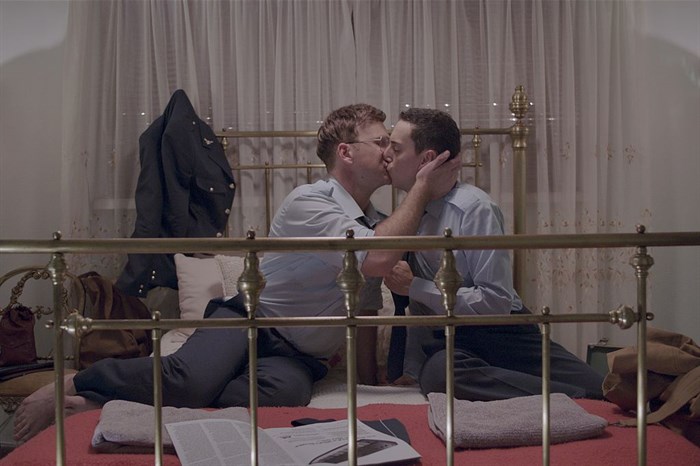
I have known many people like him in my life and I never refer to them as gay – I think of them as “tannies”. Sexuality is a very strange thing in their lives. I don’t think they necessarily identify with any label regarding sexuality. It is not who they are. Germandt immediately just understood this character and made it his own. There was always the fear that it could become a caricature, but luckily he is such a technical actor that he could play the part with great integrity. But the importance of his character in relation to the other two in this trio of friends is unmistakable. And that’s exactly the way it was with my friends when we were in the army.
This is such an important message in the film. This is a moment that every single person can relate to. The terror of staring into the mirror and acknowledging that you are the greatest bully of them all. People relate to this aspect of human nature all over the world, but it is very apparent with in the Afrikaner nation that we tend to put each other down and not encourage anyone to fly as high as they possibly can. And that is why it was so enlightening to encounter people like the ones on which Anna-Mart’s character was based, in real life – people who could open your eyes to the idea of full potential.
Indeed. The scene is a big eye-opener. The political agenda outside the military had not been heard at all, by that stage of the film. Not by us as an audience; neither by our characters in the film. So as we discover certain things about South African society, our characters discover them for the first time as well. There was such naivety about politics back in the day. We all simply believed what we were told. Any other opinion was clearly wrong. But isn’t that the way that politics still go today? Is anybody ever willing to listen to an opposing idea?
Once again it is the idea of photographs coming to life. Every single one of those images (with the exception of the Kanaries) are re-posed images we had found from the actual border war. Including Laudo Liebenberg’s “Happiness is a 100 confirmed kills” t-shirt.
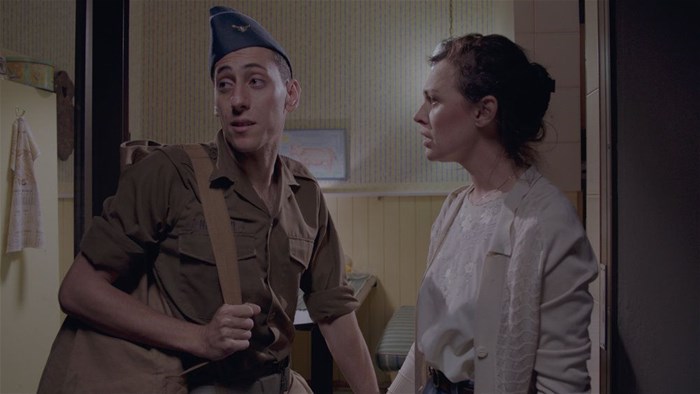
Absolutely not. But, obviously, we are overjoyed. We have realised that clearly there is something in the narrative of this film that speaks to people everywhere. You do not have to understand the history of South Africa or the history of racial relations in this country, to understand this film.
Christiaan and my motto on set was: what would it have been like if we had seen a film like Kanarie when we were 18? How would it have affected our lives? And by looking at young people watching the film and talking to me after about their lives and their experiences, I understand what this film can mean to so many people. It shows you that no matter who you are and what your situation, whether you are being bullied for being different or fat or whatever the case may be, you are not alone.
 What do you hope audiences will get from watching Kanarie?
What do you hope audiences will get from watching Kanarie?I am Afrikaans and we made this as an Afrikaans film to be seen by Afrikaans people. Obviously, we’ve never wanted to limit it to them, but it is important that they see this film. The characters talk about acceptance and it is important for people to know that even today, questions about religion and sexuality are all at the forefront of making people feel as if they do not fit in or belong.
There is so much unhappiness that has been caused by a society that will not embrace people who think and feel differently to them. And it is time for people’s eyes to be opened to the reality of what it feels like to walk around burdened by these thoughts and being in constant turmoil. But it is also time for people to stare into the mirror and realise that they can overcome their own demons, their own wars that they are constantly fighting within themselves. They need to celebrate themselves and even though it is not easy, they should never stop working towards that.
